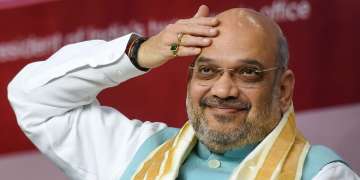The nation has been rocked by anti-CAA protests and Delhi was crippled by large-scale violence against the legislation, while his utterances that a National Register of Citizens will come into play eventually, united the opposition against him. Yet, what may come as a surprise to naysayers, 50.7 per cent people in the IANS-CVoter 'State of the Nation' Republic Day survey said that they are "very much satisfied" with Amit Shah's performance as India's Home Minister.
In the survey, released on Sunday, 25.2 per cent of respondents said they are "satisfied to some extent", while 24.2 per cent said they are not satisfied with him at all.
What can be perplexing to many, 78 per cent of Puducherry backed him which turned out to be maximum from any state or Union Territory. To put things into perspective, only 3.9 per cent from the UT said they are "very much satisfied" with the BJP-led Central government.
His home state Gujarat, apart from Himachal Pradesh, Uttarakhand, Uttar Pradesh and Haryana, remains bullish on him. As many as 68.4 per cent respondents in Himachal, 66.6 per cent in Uttrakhand, 62.7 per cent in UP, and 63.9 per cent Haryana said they are "very much satisfied" with him as the nation's Home Minister. 64 per cent respondents from his home state said the same.
Ever since the Modi government came back to power with a thumping majority of 303 seats in May last year, Shah, as Union Home Minister, has created an image of his own, by daring to venture into areas that have so far been uncharted territories. Be it passing of the triple talaq Bill that criminalised instant triple talaq or abrogation of Article 370 of the constitution tat gave special powers to the erstwhile state of Jammu and Kashmir -- he went full frontal.
He also axed Article 35A and split up J&K into two Union Territories, moves that were seen to be extremely bold. While they created his own fan base among his supporters and even fence-sitters, it also irked many, namely the minorities.
When the contentious Citizenship Amendment Bill was passed in December last year to gives non-Muslim refugees from neighbouring Muslim-majority nations of Afghanistan, Pakistan and Bangladesh a fast track route to obtain Indian citizenship, minorities and a sizeable section of the intelligentsia broke out in protests.
Till date, the protests are going on and the capital's Shaheen Bagh blockade against the Act has made international headlines which repeatedly questioned Shah's 'intent' behind bringing CAA in the first place. One would have thought Shah's image has taken a strong beating due to the ongoing stir. But the IANS-CVoter State of the Nation survey show the majority of Indians are still rock solid behind him.
Dr Yashwant Deshmukh of CVoter told IANS: "Much of the ongoing CAA or NRC protests seem to not to have hurt their image. I was expecting poor numbers from states like Assam. But the ground reality appears to be different."
Deshmukh isn't factually incorrect. Assam, the state that kickstarted the anti-CAA row is still favouring Shah with 41.7 per cent of its respondents, saying they are "very much satisfied" with him at the helm in North Block.
With Delhi going to poll next month, 46.6 per cent of respondents said the same about Shah, and did 50.8 per cent in Bihar, which will go to polls later this year.
After all the anti-CAA protests and ensuing violence that saw tinge of communal rants seem not have hurt the 'Shah' of the BJP.
Conducted with a sample size of 30,240 people spread across all 543 Lok Sabha seats, the survey was conducted in 12 weeks till January 25.
